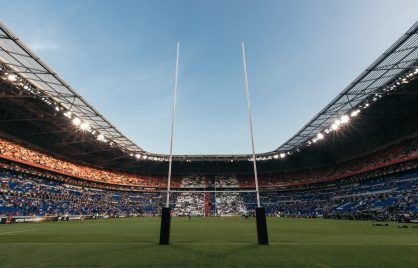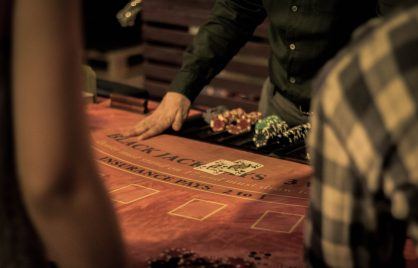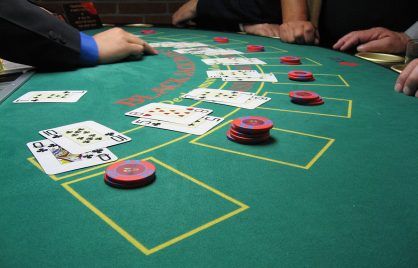The Taj Mahal: the Rise and Fall of the Eighth Wonder of the World
Today, whether you live near Atlantic City or not, finding a casino convenient to your home is no problem at all for most Americans. But that wasn’t always the case. Prior to 1978, there was only one state in the country where land-based casino gambling was legal, and that was Nevada. Then on May, 26th of that year, New Jersey became the second state to offer legalized casino gambling with the opening of Resorts Casino in Atlantic City.
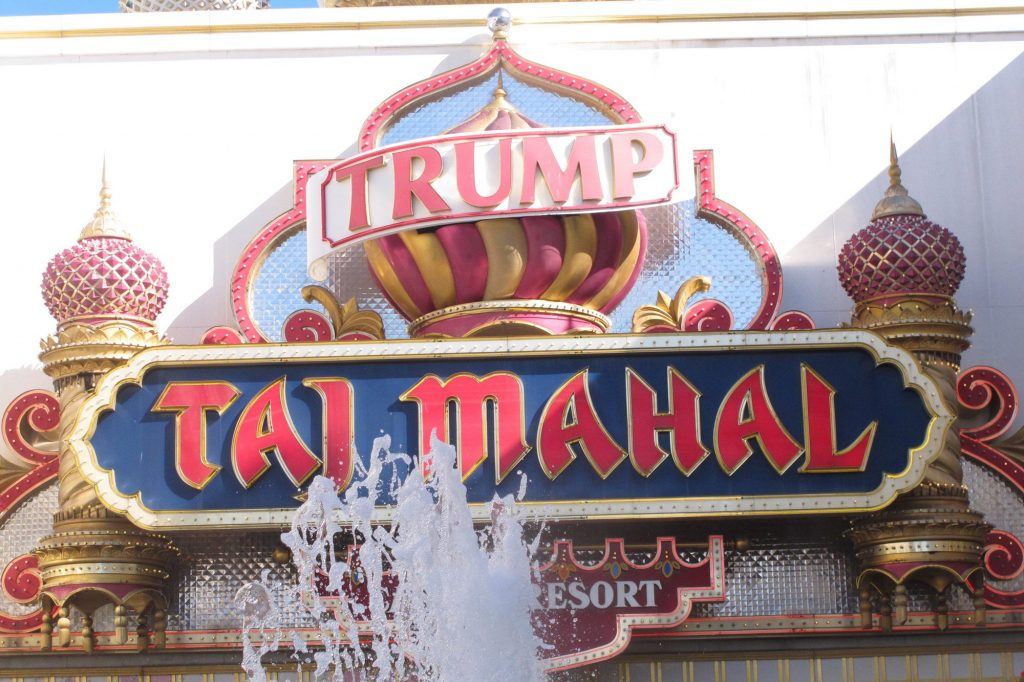
Donald Trump Called his Third Atlantic City Casino Hotel the Eighth Wonder of the World. (Wayne Parry / Associated Press)
Since that time, Atlantic City has had a long succession of other casino openings, along with multiple closings. However, what is more noteworthy is the tremendous proliferation of casinos all across America. Out of the 50 states, all but seven have jumped on the bandwagon. Meanwhile, Atlantic City is only two years away from the 40th anniversity celebration of casino gambling there, but the heavy competition from other markets has impacted Atlantic City greatly, and the town’s uncertain future has many analysts worried.
A few Atlantic City casinos, like the Borgata, have achieved spectacular success, while others have had a rockier history, and then there is the Revel, which was doomed from day 1. But of the eight existing casinos, none have exhibited a more precipitous decline than the Trump Taj Mahal.
Once a shining example of opulence and splendor, the casino hotel that former owner Donald Trump dubbed “the eighth wonder of the world”, probably now has more people demonstrating outside the building than there are active players inside the building. For those who were fortunate to experience the majestic Taj in its heyday, only to see the place slowly but steadily become a shadow of its former self, at least there should be some happy memories. But sadly, the Taj Mahal Atlantic City today is no more the eighth wonder of the world than the still standing empty Trump Plaza is still “the center of it all.”
In fact, the Taj was slated to become the fifth Atlantic City casino closure in 2014,. However, it miraculously avoided that fate at the eleventh hour due to a timely sale to billionaire businessman and close friend of Trump, Carl Icahn, who promised to pour $100 million into the resort to return it to its glory days of the past. Icahn’s lofty promises were reminiscent of those of Trump himself back in 1990 and in 2016, too, only for bigger stakes. While Icahn was saying “I can make the Taj Mahal great again, Trump is now saying “I can make America great again.”
Trump probably has mixed feelings about the fact that the casino still bears his name even though he has not been involved in its operations for some time. On the one hand, his ego must love the sight of his name in big bold letters. On the other hand, the last thing he wants is to lose presidential votes because people mistakenly blame him for what has happened to the casino resort under different leadership, thus reminding the American public “I left Atlantic City before it cratered.” More recently, in his presidential nomination acceptance speech, Trump confidently asserted “Nobody knows the system better than me. I am the only one who can fix it.”
Ironically, Icahn, who exuded a similar level of confidence when he saved the Taj Mahal from closure two years ago, is now ordering its closure.
Although, presumably, the Taj’s days are now numbered, that is precisely what everyone was thinking two years ago. As the old saying goes, “the opera ain’t over till the fat lady sings,” so once again, as unlikely as it may seem, the casino might not close after all. Meanwhile, let’s delve a little deeper into the fascinating story of how far this magnificent property has fallen.
Donald’s Billion Dollar Baby
When the Trump Taj Mahal opened for business on April 2, 1990, as Atlantic City’s 12th casino hotel, it was not only the largest in Atlantic City, but also the most expensive to build, costing over $1 billion. Trump already owned two other casinos in Atlantic City, the Trump Plaza, which opened in 1984 (and closed in 2014) and Trump Castle, which opened in 1985 (and was renamed the Trump Marina in 1997, and ultimately became the Golden Nugget after being sold to Landry, Inc. in 2011). However, as long as Trump was permitted to own up to three casinos, he was not going to let anything stop him.
Accordingly, Trump bought the Taj Mahal from the original owner, Resorts, while the casino hotel was still in construction. Thereafter, no expense was spared, and the new acquisition, which Trump considered his “crown jewel,” opened with great fanfare. A laser and fireworks display marked the occasion, and actors in costume paraded through the hotel lobby. But a crowd estimated at 10,000 also got to see a beaming Trump standing on a dais with a large Aladdin lamp and hear him proclaim “What’s happened here is really beyond my wildest expectations.” Michael Jackson was also brought in to entertain as part of the Grand Opening festivities.
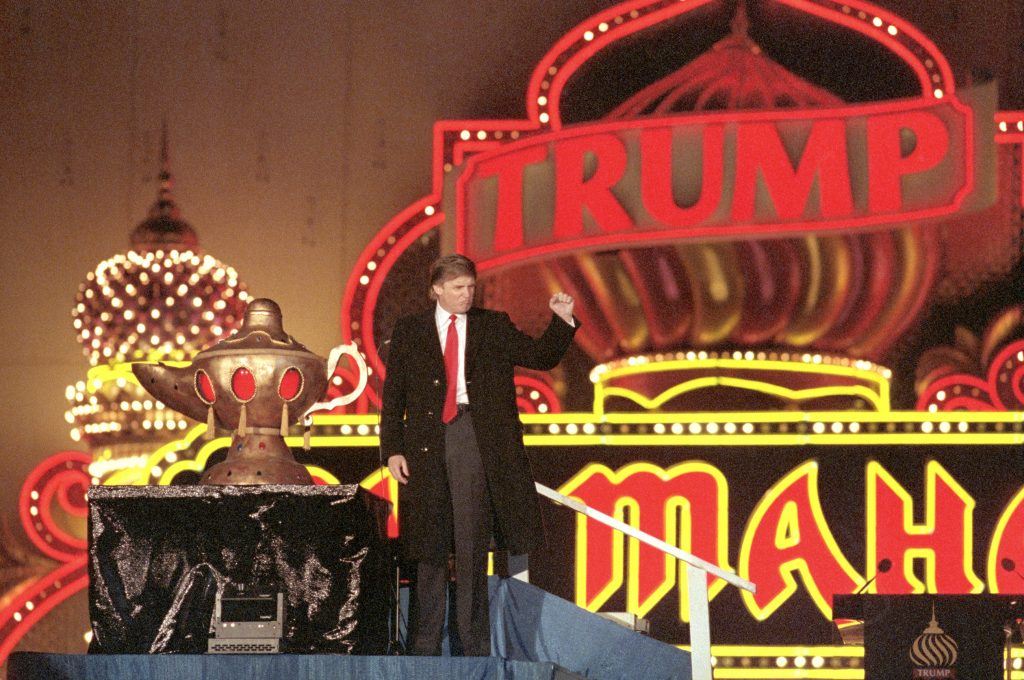
Trump had good reason to be proud of his third Atlantic City casino hotel. After all, it offered all of the following:
- One of the world’s largest casinos: 120,000 square feet of gambling space, including 3,000 slot machines and more than 160 tables
- The largest poker room (at the time) in Atlantic City
- $14 million worth of crystal chandeliers
- Deluxe guest rooms and luxurious suites, some costing as much as $10,000 per night
- 13 restaurants
- Pool, health club, and other recreational amenities
- Multiple entertainment venues, including a 5,500 seat arena

The new resort’s amenities certainly sounded impressive. But many guests found to their dismay, at least on opening day, that not everything was smooth sailing. There were long lines to get into the casino, every restaurant and snack bar was filled to capacity, and checking into the hotel took up to five hours due to computer problems. On a brighter note, among the thousands of people who played in the casino, surely there were some who were winners. But the real opening day winner was Trump himself since the Taj Mahal won $604,000!
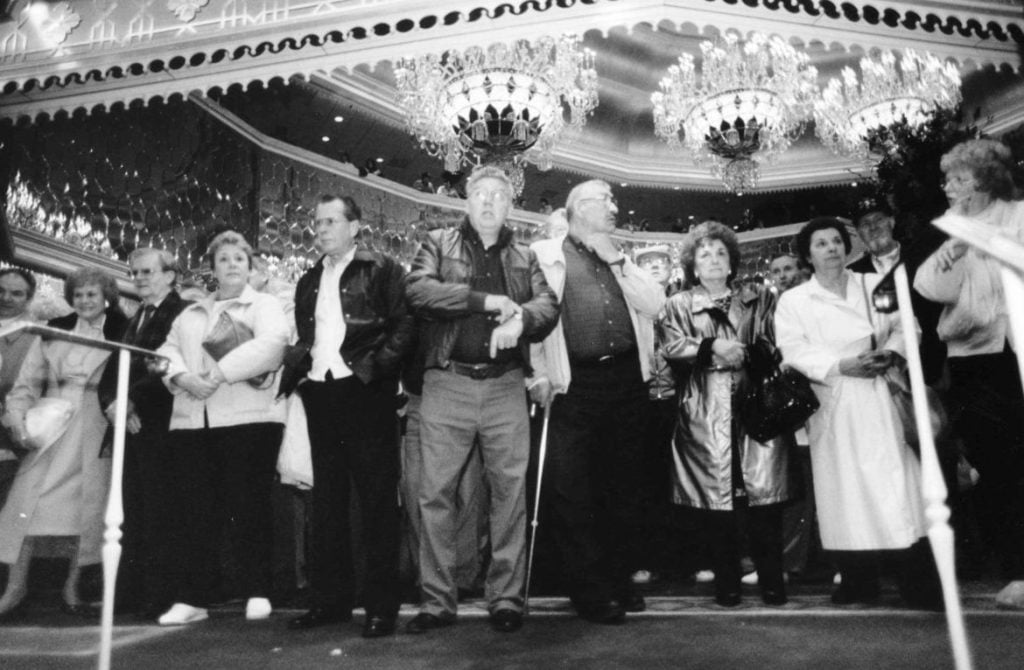
Trump loved bringing high rollers and top boxing and entertainment celebrities to his casino. Another thing he loved doing was celebrating his own birthday. For his 50th birthday, the Beach Boys performed. For his 60th birthday in 2006, revelers were invited to a James Bond-style “birthday heist” consisting of more than $200,000 in cash and prizes.
Bankrupt in Less Than a Year
Depending on your personal taste, you might find both the extravagant décor of the Trump Taj Mahal and the bigger than life personality of the man most closely identified with the property, somewhat over the top. But the same could also be said about the former owner’s propensity for overspending, resulting in a mind-blowing debt of more than $820 million. It took less than a year from the time the $1.1 billion resort opened for the “eighth wonder of the world to go into the first of four bankruptcies.
After a second bankruptcy in 2004, Trump lost the majority of his control of the property to bondholders. Then, in 2009, he resigned as Chairman of Trump Entertainment Resorts and in effect no longer had any control over either the Taj Mahal or his other two Atlantic City holdings. However, he was allotted a 10% stake in the Taj Mahal in return for the continued use of his name, that is until a fourth bankruptcy in 2014 erased his ownership completely.
The only reason the Taj Mahal was able to avert becoming the fifth casino in Atlantic City to close in 2014 was that Trump’s friend, Carl Icahn, another billionaire, agreed to invest $100 million in the property. Icahn had already purchased the Tropicana in 2010 for $200 million and brought that casino hotel out of bankruptcy to profitability. Therefore, many people were confident that he could do the same for the Taj Mahal. Icahn bought the Taj Mahal for a discounted price of about $300 million and brought it out of bankruptcy. The sale was finalized in February, 2016, at which point Icahan officially became the new owner.
Reopening of Taj Mahal Poker Room
One notable change that the new owner, Icahn, made was to reopen the poker room. The Taj Mahal poker room once had 48 tables and was the second largest in Atlantic City (behind the Borgata). It was used as a setting for several movies, including Rounders. But in February 2015, the room, which was no longer showing a profit, was closed for renovations, and remained closed for 15 months.

The closing of the poker room probably contributed to the steady decline in customers overall, not just poker players. For example, when a husband and wife visit an Atlantic City casino, one might prefer poker, while the other prefers slots or table games. So it would make sense to visit a casino that offered both options. Out of the eight existing Atlantic City casinos, the Taj Mahal was next to last in 2015 revenue (trailed only by Resorts).
On Saturday, May 13, 2016, when the poker room finally had its heavily promoted soft opening, only about six of the room’s 25 tables were open. However, Tony Rodio, President and CEO of Tropicana Entertainment, called the reopening “an exciting time for Trump Taj Mahal.”
Rodio further stated “Our strategy is to put our customers’ interests at the heart of every decision we make as we return the Taj to its rightful place as a leading gaming and entertainment destination.”
No Health Insurance and the Longest Strike in Atlantic City History
When Carl Icahn first took over ownership of the Taj Mahal, he promised to invest $100 million toward property improvements, with the reopening of the poker room being one of many. However, with the possibility that New Jersey voters might vote yes in November to a referendum allowing casino expansion to North Jersey, Icahn has amended his statement, now saying he would only invest the money if the referendum is defeated.
He is also steadfastly refusing to meet the demands of Union 54, which represents the hotel’s many service workers, including cooks, housekeepers, bellmen, bartenders, and cocktail servers. This has resulted in more than 1,000 of these workers going on strike.
Unfortunately, the strike is no closer to being settled now than when it began on July 1. The workers, who currently receive no health benefits of any kind from the Taj Mahal, maintain that it is only fair that they receive the same level of health benefits for themselves and their families as their counterparts at other Atlantic City casinos. Although Icahn made a lesser offer, the union rejected it.
According to the union, many of the striking workers have to rely on taxpayer-subsidized health insurance, while 1/3 of the workers have no health insurance at all. The union’s position is that the strike is Icahn’s own fault because all the workers are asking for is a decent enough health plan to provide adequate protection for themselves and their families.
Icahn’s position is that because the Taj Mahal is not operating at a profit like the other Atlantic City casino hotel he owns, the Tropicana, it is unreasonable for the workers to expect the same health benefits plan. Icahn blames the striking workers for not accepting the plan he was willing to offer and thereby “preventing a path to profitability.”
Likewise, Tony Rodio, in a dramatic reversal of his statements a few months ago, had this to say in August, 2016:
“Currently the Taj is losing multimillions a month and now with this strike we see no path to profitability.”
Icahn Announces that on October 10, 2016 the Taj Mahal Will Close
In the wake of these developments, Icahn has decided that the Taj Mahal can’t keep “hemorrhaging” money at the present rate. And therefore, the only alternative would be for it to close shortly after Labor Day. Accordingly, adhering to the requirement for 60 days advance written notice, all employees received written notification that the Taj will close on October 10, 2016
As of this writing, the Taj Mahal Hotel and Casino remain open for business, but only a few restaurants are open and hotel services are limited due to the continuing shortage of staff. If the Taj Mahal closes as planned on October 10, it would become the fifth casino to do so since 2014 and approximately 3,000 workers will lose their jobs.
As for Trump, the man whose name at one time was virtually synonymous with Atlantic City casino gambling, the last vestige of his presence in Atlantic City will be gone.
